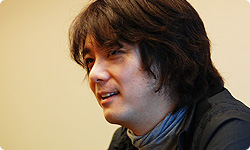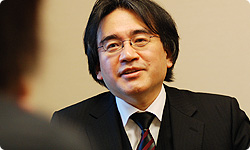3. Somebody Picks Up Dropped Jobs
So Hino-san, you must personally determine the company direction as you do business. On the other hand, I'd assume that part of the function of your team is to fill in the blanks for you, show you things you can't see on your own. Which parts do you decide on your own, and which do you discuss with others before deciding?
Ah… That was what I most wanted to ask you, Iwata-san. (laughs)
(laughs)
Let's see… In my case, it feels as though I spent the first five years after starting LEVEL-5 without asking for anyone's opinion, really. Actually, even today at LEVEL-5, it doesn't feel as though I've relinquished jobs to anyone.
But you've come up against the limits of what you can do on your own, haven't you?
Yes, of course, I can't do everything, and even now I'm over the limit. There is a certain type of game that I say I want to make, and I decide the direction the advertising will take, but in order to carry it out, I need the expert knowledge of all different sorts of people. They've all acquired their expertise on their own, and they're kind enough to work to ensure that we produce the maximum results for the image I've got. It isn't that I've expressly told them to do it; it feels as though things just naturally began to flow that way.
What do you think created that division of roles?
I really do think it's a special case. Normally, someone says, "I'll leave this part to you," and that's how jobs are distributed, but LEVEL-5 doesn't work that way. What generally happens is that I do all sorts of things, and I gradually need more hands than I've got. When that happens, someone says, "Okay, then, I'll do this bit," and picks up the job I've dropped. At first, they started doing it to sort of clean up after me, but before long it created a division of roles inside the company, and those finally turned into legitimate departments.

I see, yes, that is interesting. I think many people wonder how you manage to turn out so many things at such a fast pace. The things you want to do, the things you can do, and the things you have to do. Striking a balance among those three is one part of management, and it seems to me as though you're living your life being faithful to the things you want to do.
Yes.
Of course, there are limits when it comes to doing everything you want to do all by yourself, and it's only natural that you'll lose your grip on a few of them. But the people on your team follow you, gathering the jobs you've dropped, and they enjoy themselves while they're at it. That may be because there are a lot of people around you who think, "Hino-san's taking us to a world we couldn't reach by ourselves."
That might be it.
There's a mountain of jobs piled on the table, and everyone starts taking jobs even without being ordered to, and before you know it, the mountain is gone. From the standpoint of an organisation, that's one ideal. That said, in practice, it's fairly difficult, so we create organisations and divvy up roles. In your case, though, you don't determine the roles beforehand. Instead, everyone else thinks about what he or she would have to do in order to get the organisation to where you, Hino-san, want to take it.
Yes, each one of us came to think for ourselves naturally.
Certainly, as far as organisational development processes are concerned, I think that one's fairly unique.
In the beginning, I handled the advertising as well. But we got more and more publicity jobs, so someone would raise his hand and would begin to do new things, using what I'd done previously as a foundation to work from. That became a flow of sorts, and what was first done on an individual level has become an organisation. It really does feel exactly like that.
In what's known as big company syndrome, when organisations are divided mechanically, it gets easier for the divisions to blame the parts they can't do perfectly on each other, or to look out only for one's own organisation. But what you've just told me is the polar opposite of big business syndrome: the ultimate goal is to create the things you wanted to do, to get them out into the world, and to have them accepted there. To make that happen, all the jobs on top of the desk have to be gone, and that's the common mindset among all members of your team.

I do think that's it.
One other important thing is whether or not you are grateful to and respect the people around you. The organisation doesn't crumble even though you stick to your guns about what you want and run straight towards it, and I think the secret there is that your feelings of gratitude and respect towards the people who pick up the jobs for you get through to them. I think that's a relationship that's first established when they realise, "Hino-san acknowledges us."
You're right. I am very grateful, but does that actually get across…? I don't know. (laughs) But when I look back, I honestly do think that as a company, there's a sense of power about LEVEL-5 now, a power that says we can do what other companies can't.
I think people in your company are making much of the individuality in the way the company creates things, from the rapid speed of development, and the degree of player satisfaction with regard to the finished product. In the Professor Layton series, for example, it must naturally have been a great challenge to maintain the quality of the series as you released it at that speed. Even as you released the series, you were developing other works as well.
That's true. My objective is, first of all, to liven up the games industry, and my goal is to create a new game franchise every year. So the year after we created Professor Layton and the Curious Village, we made the Inazuma Eleven series17, and after that it was Ni no Kuni18 and The Little Battlers19. I feel as though, if we don't keep putting out new games that way, the game world really will be finished. So, while we create new games as our primary focus, since we also need to stabilise as a company, we create series games as well. 17 The Inazuma Eleven series: A football RPG with collection and training aspects. The first game was released for the Nintendo DS system in August 2008 in Japan. Three games have been released in the series so far. (Not yet released in the UK) 18 Ni no Kuni: An RPG released for the Nintendo DS system in December 2010 in Japan. (Not yet released in the UK) 19 The Little Battlers: An RPG scheduled for release in March 2011. (UK plans have not been announced at this time)
Because if you can create a sound foundation with your series, it becomes easier to take on new challenges.
That's right. I think that if Professor Layton and the Curious Village hadn't been such a hit, the Inazuma Eleven series would never have been created.